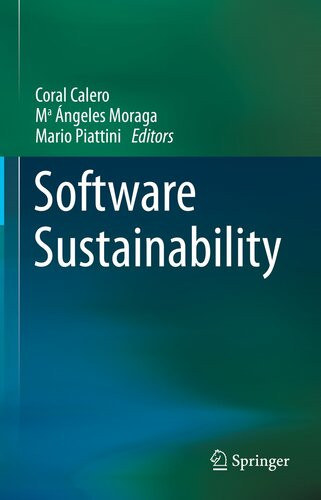

Most ebook files are in PDF format, so you can easily read them using various software such as Foxit Reader or directly on the Google Chrome browser.
Some ebook files are released by publishers in other formats such as .awz, .mobi, .epub, .fb2, etc. You may need to install specific software to read these formats on mobile/PC, such as Calibre.
Please read the tutorial at this link. https://ebooknice.com/page/post?id=faq
We offer FREE conversion to the popular formats you request; however, this may take some time. Therefore, right after payment, please email us, and we will try to provide the service as quickly as possible.
For some exceptional file formats or broken links (if any), please refrain from opening any disputes. Instead, email us first, and we will try to assist within a maximum of 6 hours.
EbookNice Team

Status:
Available5.0
22 reviewsThis book focuses on software sustainability, regarded in terms of how software is or can be developed while taking into consideration environmental, social, and economic dimensions. The sixteen chapters cover various related issues ranging from technical aspects like energy-efficient programming techniques, formal proposals related to energy efficiency measurement, patterns to build energy-efficient software, the role of developers on energy efficient software systems and tools for detecting and refactoring code smells/energy bugs; to human aspects like its impact on software sustainability or the adaptation of ACM/IEEE guidelines for student and professional education and; and an economics-driven architectural evaluation for sustainability. Also aspects as the elements of governance and management that organizations should consider when implementing, assessing and improving Green IT or the relationship between software sustainability and the Corporate Social Responsibility of software companies are included. The chapters are complemented by usage scenarios and experience reports on several domains as cloud applications, agile development or e-Health, among others. As a whole, the chapters provide a complete overview of the various issues related to sustainable software development.
The target readership for this book includes CxOs, (e.g. Chief Information Officers, Chief Executive Officers, Chief Technology Officers, etc.) software developers, software managers, auditors, business owners, and quality professionals. It is also intended for students of software engineering and information systems, and software researchers who want to know the state of the art regarding software sustainability.